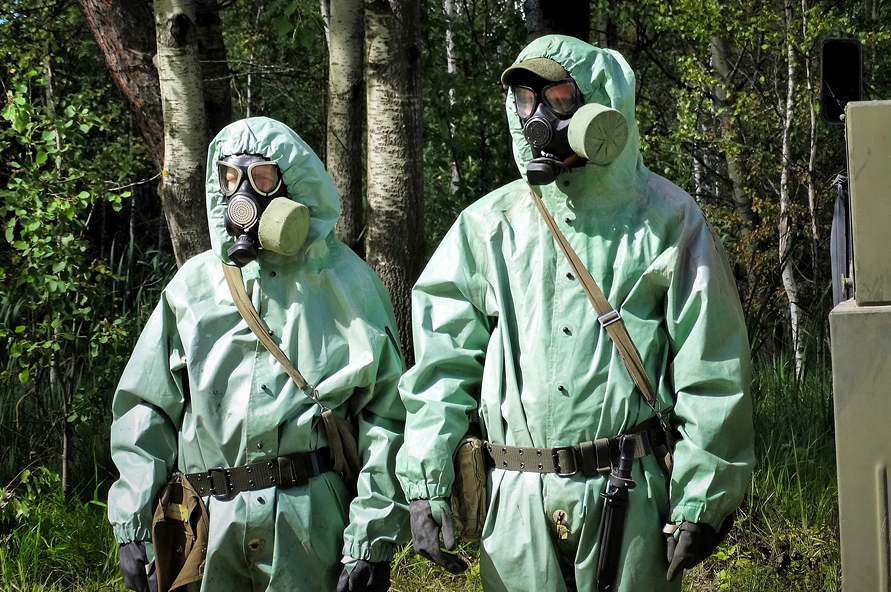ISO 13934 Tensile Strength Testing of Protective Clothing Fabrics
The ISO 13934 standard is a critical component in evaluating the tensile strength properties of protective clothing fabrics, especially for military applications where NBC (Nuclear, Biological, and Chemical) protection is paramount. This test measures the ability of fabric to withstand mechanical stress before failure occurs, ensuring that personal protective equipment (PPE) meets stringent safety requirements.
The standard applies specifically to woven, knitted, or nonwoven fabrics used in military-grade protective clothing designed for NBC environments. The testing process involves clamping a specimen between two grips and applying a controlled force until the fabric breaks. This method provides quantitative data on tensile strength, elongation at break, and other relevant mechanical properties.
For quality managers overseeing the development of new PPE models, compliance officers ensuring regulatory adherence, R&D engineers refining material formulations, and procurement teams sourcing reliable suppliers, this test is essential for confirming that fabrics meet or exceed industry standards. Military personnel rely on these tests to ensure they are equipped with robust, durable protective gear capable of withstanding harsh environmental conditions.
The tensile strength test is just one part of a comprehensive suite of evaluations conducted according to ISO 13934, which also includes impact resistance and flame retardancy assessments. By focusing on tensile properties, this service ensures that fabrics are not only strong but also flexible enough for comfortable wear by soldiers in the field.
Our state-of-the-art laboratory adheres strictly to ISO 13934 guidelines, using high-precision instruments calibrated according to international standards. We employ experienced technicians who understand both the theoretical underpinnings and practical applications of this testing method. Our facility is equipped with advanced equipment capable of generating consistent, reliable results.
When selecting a laboratory for ISO 13934 tensile strength testing, it's important to consider several factors including expertise in military-grade materials, state-of-the-art instrumentation, adherence to international standards, and robust quality control measures. Our team prides itself on delivering accurate, repeatable results that can be trusted by all stakeholders involved.
By choosing our laboratory for this critical testing service, you are investing in the safety and well-being of your personnel while also supporting ongoing research aimed at improving protective technologies. With years of experience behind us, we stand ready to assist with any questions or concerns regarding this important aspect of military equipment development and procurement.
Our comprehensive approach ensures that every step—from specimen preparation to final analysis—meets the highest industry standards. From initial consultation through report generation, our team works closely with clients to ensure a seamless process tailored specifically to their unique needs.
Applied Standards
| Standard Reference | Description |
|---|---|
| ISO 13934-1 | Tensile properties of fabrics used in protective clothing (Part 1: Test methods) |
| EN ISO 20685-1 | Fibres and yarns — Determination of tensile properties using extension at break (Part 1: General principles) |
| Standard Reference | Description |
|---|---|
| ASTM D5034 | Tensile testing of fabrics using a constant rate of elongation |
| IEC 61967-2 | Photometric measuring systems — Part 2: Colorimeters and spectrophotometers for the measurement of color and spectral characteristics |
Benefits
Tensile strength testing according to ISO 13934 is vital for ensuring that protective clothing fabrics are capable of withstanding the rigors of military operations. By adhering strictly to this standard, our laboratory delivers accurate and reliable results that contribute significantly to overall product quality assurance.
Our services offer several key benefits:
- Informed Decision-Making: Data-driven insights enable informed decisions about material selection, design improvements, and production processes.
- Regulatory Compliance: Ensures adherence to international standards, facilitating smoother compliance with regulatory requirements.
- Enhanced Product Performance: Rigorous testing enhances fabric performance attributes such as durability, flexibility, and comfort.
- Improved Safety: Robust fabrics contribute directly to enhanced safety for military personnel operating in hazardous environments.
- Quality Control: Consistent quality assurance measures help maintain high standards throughout the manufacturing process.
- Competitive Advantage: Superior testing capabilities can differentiate products in competitive markets, attracting more customers and increasing market share.
In summary, our ISO 13934 tensile strength testing service provides comprehensive support for military-grade protective clothing development. It offers robust data that informs strategic decisions, ensures regulatory compliance, improves product performance, enhances safety, strengthens quality control processes, and establishes a competitive edge in the marketplace.
Environmental and Sustainability Contributions
Incorporating environmental considerations into military testing aligns with broader sustainability goals. By ensuring that fabrics used in protective clothing are durable yet flexible enough for comfortable wear, our services contribute to reducing waste associated with frequent replacement of substandard materials.
The use of advanced technologies allows us to minimize energy consumption during the testing process itself. Additionally, by providing accurate and reliable data early in the development cycle, we help manufacturers reduce material wastage through more precise design iterations before production begins. This approach not only saves resources but also supports long-term sustainability objectives within the military sector.
Furthermore, our commitment to continuous improvement ensures that testing methods evolve alongside emerging technologies and best practices. As new challenges arise—whether related to climate change or evolving threats in operational environments—we remain dedicated to staying ahead of these issues through innovative solutions designed specifically for military applications.
Our focus on sustainability extends beyond just the technical aspects of ISO 13934 testing; it encompasses all stages of product lifecycle management, from raw material sourcing to end-of-life disposal options. By integrating environmental considerations into our services, we strive to contribute positively to both immediate operational needs and future generations.





